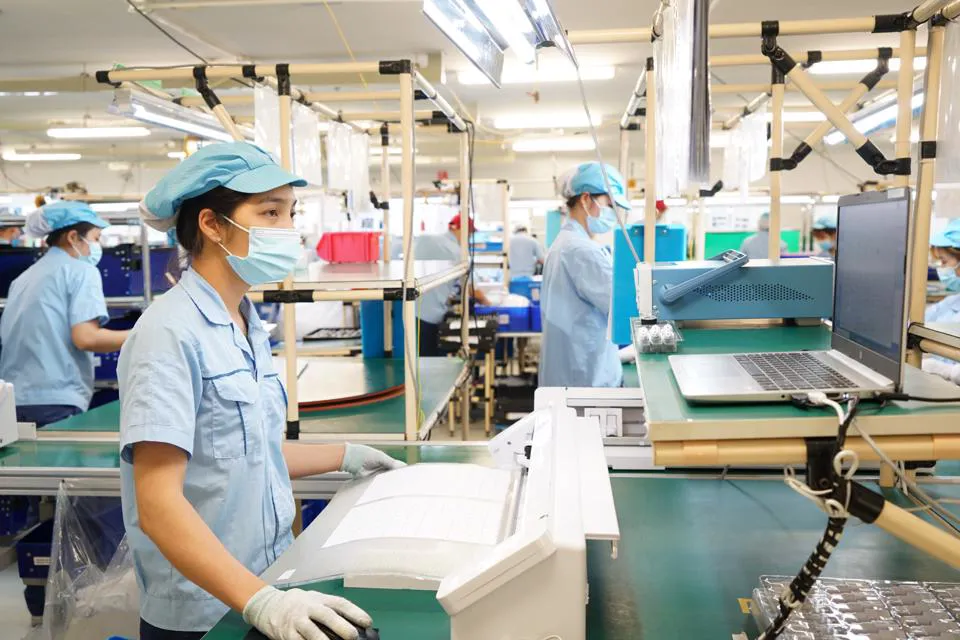Businesses expect fast implementation of new support programs
Timing is essential for support programs to be effective.
The injection of cheap capital into the market under new supporting programs would help businesses offset negative impacts from the pandemic and resume operation, but timing proves to be an essential factor for such a policy to be effective.
| Electronics production at Rhythm Precision Vietnam in Soc Son District. Photo: Pham Hung |
In early 2022, the National Assembly issued Resolution No.43/2022/QH15 on monetary and fiscal support programs worth a combined total of VND350 trillion (US$15.4 billion) to aid economic recovery and adaptation to a new normal.
These include a fiscal support package of VND291 trillion ($12.8 billion) and a monetary one of VND46 trillion ($2 billion).
Under these programs, the Government via the network of commercial banks would allocate a maximum of VND40 trillion ($1.76 billion) to offer an interest subsidy of 2% per annum for businesses in priority fields, especially those with good financial conditions and high potential to recover in the post-pandemic period.
Meanwhile, commercial banks are encouraged to further streamline operational expenses and cut lending rates by 0.5-1 percentage points in the 2021-2022 period, along with rescheduling debt payment and waiving/freezing lending rates for those affected by the pandemic.
Director of Tu Anh Printing Company Nguyen Anh Tu (Thanh Tri District, Hanoi), told The Hanoi Times that the company is having a hard time surviving the pandemic. “We are very interested in the upcoming credit support, but it is not clear whether the company is eligible for the program,” Tu said.
Thu Nga, director at a construction company in Hanoi, said it is having an outstanding loan of VND4 billion ($177,000) from a commercial bank with a lending rate of 9% per annum.
“We are contacting the bank to ask for lowering interest rates, but they said the support is only applicable for new loans,” Nga told The Hanoi Times.
According to experts, with the Government’s interest subsidy worth up to VNVD40 trillion ($1.76 billion), the actual credit being pumped into the economy could be estimated at VND2,000 trillion ($88.37 billion), equivalent to 20% of total outstanding loans in the economy.
“While such an amount is huge, the credit package should be disbursed promptly for the benefit of businesses, and eventually the economy,” said banking expert Can Van Luc.
Vice General Director of Vietcombank Nguyen Thanh Tung suggested the State Bank of Vietnam (SBV) should allow commercial banks to decide their credit growth quota based on their efficiency and capability for risk management.
“Vietcombank targets a 12% growth in credit against 2021 to support the capital demand of the economy,” Tung told The Hanoi Times.
Secretary-General of the Vietnam Banks Association Nguyen Quoc Hung, however, expressed concerns that not many businesses would be able to secure loans from the banks.
“The majority of businesses are in difficult financial situations, so it would be impossible for many to get loans from banks without the latter lowering their lending criteria. From the banks’ perspective, however, rising bad debts in case of default on these loans is the most concerning issue,” Hung said.
Representatives of several companies in the tourism sector added banks are currently offering loans for companies with mortgages and good financial situations, so the interest subsidy of 2% may be out of reach for many in this field.
“The Government should consider a more favorable lending mechanism for businesses to better access capital,” economist Tran Du Lich said.
“Only when this bottleneck is resolved, then the credit package can truly be effective,” Lich told The Hanoi Times.













